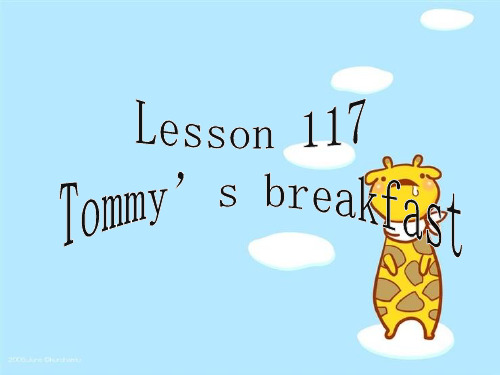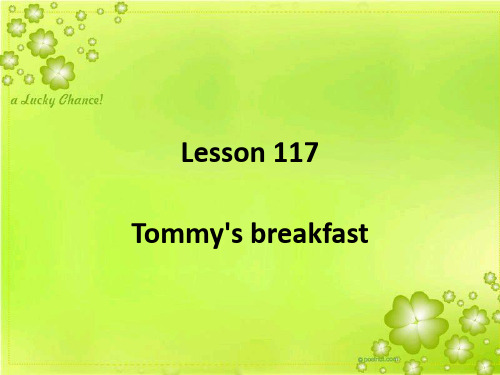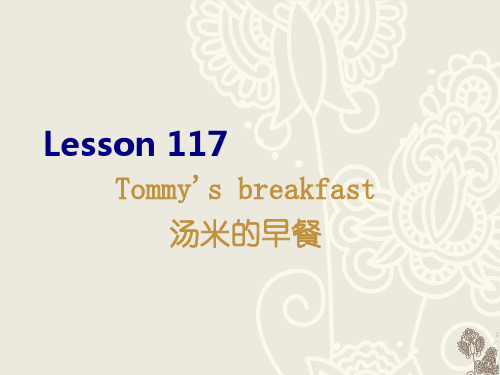新概念一册lesson117课文及插图
合集下载
新概念一117课精美课件

今天8:00am
他正在看书。
He is reading a book.
她正在看书。
She was reading a book.
昨天8:00am
过去进行时
1.构成
主语+was/were +现在分词
2. 过去进行时的基本用法
1)表示过去某一时间正进行的动作。 They were shaving at seven this morning. 今晨7点钟的时候他们正在刮胡子。
bedroom
kitchen
卧室
厨房
coin 硬币 note 纸币
Swallow
1)v. 吞……,咽……
He swallowed (up) the madicine with water.
他把药和水一起吞下。
2)n.燕子
later
1)adv. 后来,较迟地,较后地 three days later 三天后
Lesson 117 Tommy’s breakfast
dining room
饭厅
n.硬币
n.嘴 v.吞下 adv.后来
coin
mouth swallow lining room dining table
饭厅,餐室 餐桌
sitting room / living room 客厅
几天后他们要离开。
Homework: 上课:周日10:10--12:10 作业:1.预习119 2.初中卷子
Thank you !
sooner or later 早晚,总有一天
2)adj. 较迟的,较后的,更近的 in one’s later life 在晚年
toilet
n. 厕所,盥洗室
新概念英语第一册117课 课件(共17张PPT)

• 4. The boss arrived when she was typing a letter.
• 5. The train left when I was buying the tickets.
• 6. It rained heavily when I was driving to London.
A. is having B. have C. has D. was having
4. What ____ you ____from 7 to 9 yesterday ? A. were, doing B. did. do C. have, done
5.Look! Lily with her sister __ a kite on the playground.
shaving
cut
Exercise P239
• 1. He knocked at the door when I was answering the phone.
• 2. He came downstairs when I was having breakfast.
• 3. The phone rang when I was washing the dishes.
过去进行时VS现在进行时
结构
现在am/is/are+v-ing 过去was/were+v-ing
The students are drawing pictures now.
The students were drawing pictures when the teacher came in.
3.时间状语:
New words and expressions
dining room
• 5. The train left when I was buying the tickets.
• 6. It rained heavily when I was driving to London.
A. is having B. have C. has D. was having
4. What ____ you ____from 7 to 9 yesterday ? A. were, doing B. did. do C. have, done
5.Look! Lily with her sister __ a kite on the playground.
shaving
cut
Exercise P239
• 1. He knocked at the door when I was answering the phone.
• 2. He came downstairs when I was having breakfast.
• 3. The phone rang when I was washing the dishes.
过去进行时VS现在进行时
结构
现在am/is/are+v-ing 过去was/were+v-ing
The students are drawing pictures now.
The students were drawing pictures when the teacher came in.
3.时间状语:
New words and expressions
dining room
新概念英语第一册第117-118课课件

mouth n. 嘴
• • • • • • • • Open your mouth. 嘴里塞满食物时不要说话。 Don’t talk with your mouth full! It sounds funny in your mouth. 这种话由你的口中说出来,听起来就很可笑 a useless mouth光吃不做的人, 饭桶 a big mouth[美俚]碎嘴子; 说话冒失的人; 爱吹牛, 说大话的人 Tom was born with a silver [golden] spoon in his mouth.汤姆生 于富贵之家。 • from hand to mouth 勉强糊口 • from mouth to mouth口口相传的
• He put them both into his mouth. We both tried to get the coins. But it was too late. Tommy had already swallowed them! • put sth +介词短语 把…东西放在… • 把书放在桌子上 • Put the books on the desk. • both表示“两个都…” • 他们俩都想去法国。 • They both want to go to France. • 三者或三者以上用all • 他们大家都幸福 • They were all happy.
• • • • • •
• • • • •
2.表示过去某一阶段一直在进行的动作。 他们昨天在等你。 They were waiting for yesterday. 她去年在写一部小说。 She was writing a story last year. 3.表示从过去某一个时间的角度看将要发生的 动作,用于某些瞬间动作;go, come, leave, stay, fly 等。 几天后他们要离开。 They are leaving in a few days. They were leaving a few days later. 他告诉我他的哥哥要到苏州去。 He told me that his brother was going to Suzhou.
新概念英语第一册第117课(课堂PPT)

16
117课 过去进行时练习: 一、仿照例句用所给 的词汇造句。
1. I, see him, he, cross the street I saw hi m while he was crossing the street. (He was crossing the street when I saw him.) A. the sun, shine, we, come out B. she, study at college, the war, break out C. she, work in a factory, the city, be liberate d (放) D. he, lose his pen, he, go sightseeing in th e city
17
1. While we __________ (wait) for the bus, a girl __________ (run
) up to us.
2. I __________ (telephone) a friend when Bob __________ (com
e) in.
3. Jim __________ (jump) on the bus as it __________ (move) aw
1
阅读课文回答问题
What does the she mean by ‘change’ in the last sentence ?
2
再看一遍课文
3
When my husband was going into the dining room this morning
4
he dropped some coins on the floor.
117课 过去进行时练习: 一、仿照例句用所给 的词汇造句。
1. I, see him, he, cross the street I saw hi m while he was crossing the street. (He was crossing the street when I saw him.) A. the sun, shine, we, come out B. she, study at college, the war, break out C. she, work in a factory, the city, be liberate d (放) D. he, lose his pen, he, go sightseeing in th e city
17
1. While we __________ (wait) for the bus, a girl __________ (run
) up to us.
2. I __________ (telephone) a friend when Bob __________ (com
e) in.
3. Jim __________ (jump) on the bus as it __________ (move) aw
1
阅读课文回答问题
What does the she mean by ‘change’ in the last sentence ?
2
再看一遍课文
3
When my husband was going into the dining room this morning
4
he dropped some coins on the floor.
新概念英语第一册第117课完整ppt课件

精选ppt
阅读课文回答问题
What does the she mean by ‘change’ in the last sentence ?
精选ppt
再看一遍课文
精选ppt
When my husband was going into the dining room this morning
精选ppt
续的或同时发生的,那么主从句的动词都可用过去
进行时。
精选ppt
本课语法过去进行时
1.过去进行时由“主语+was/were+动词ing”构成 2.过去进行时的否定式由“主语+was/werenot+现 在分词”构成 3.过去进行时的疑问式由“was/were+主语+现在 分词”组成 句型 肯定句=主语+was/were+doing+其它 否定句=主语+was/were+not+doing+其它 一般疑问句问语=Was/Were+主语+doing+其它 答语:Yes,Iwas/were.或No,Iwasn't/were’t. 特殊疑问句=特殊疑问词精+选p一pt 般疑问句+其它
精选ppt
本课语法
1.look for,寻找(强调动作过程);find,找到(强调寻找的结 果)。 2.Tommy had already swallowed them! 汤米已经把硬币咽了下去 句中用了过去完成时形式 had swallowed。过去完成时用来表示过去 两个动作中发生在前的那个动作。显然,句中咽下硬币的动作发生在 夫妇俩能够把硬币从汤米手中抢过来之前。 3.later that morning,那天上午的晚些时候。 later是副词late的比较级。 4.any change change是个多义词,既有“零钱”的意思,也有“变化”的意思。此 处既可指“硬币”;也可指“情况的变化”。这是双关(pun /p)n/) 修辞法。
阅读课文回答问题
What does the she mean by ‘change’ in the last sentence ?
精选ppt
再看一遍课文
精选ppt
When my husband was going into the dining room this morning
精选ppt
续的或同时发生的,那么主从句的动词都可用过去
进行时。
精选ppt
本课语法过去进行时
1.过去进行时由“主语+was/were+动词ing”构成 2.过去进行时的否定式由“主语+was/werenot+现 在分词”构成 3.过去进行时的疑问式由“was/were+主语+现在 分词”组成 句型 肯定句=主语+was/were+doing+其它 否定句=主语+was/were+not+doing+其它 一般疑问句问语=Was/Were+主语+doing+其它 答语:Yes,Iwas/were.或No,Iwasn't/were’t. 特殊疑问句=特殊疑问词精+选p一pt 般疑问句+其它
精选ppt
本课语法
1.look for,寻找(强调动作过程);find,找到(强调寻找的结 果)。 2.Tommy had already swallowed them! 汤米已经把硬币咽了下去 句中用了过去完成时形式 had swallowed。过去完成时用来表示过去 两个动作中发生在前的那个动作。显然,句中咽下硬币的动作发生在 夫妇俩能够把硬币从汤米手中抢过来之前。 3.later that morning,那天上午的晚些时候。 later是副词late的比较级。 4.any change change是个多义词,既有“零钱”的意思,也有“变化”的意思。此 处既可指“硬币”;也可指“情况的变化”。这是双关(pun /p)n/) 修辞法。
新概念英语第一册--117-118课 课件 (共31张PPT)

Grammar
1.构成 过去进行时 • was/were +现在分词 • 疑问句式 把 was/were 提前 • 否定句式 在 was/were 的后面加 not • 例:
Grammar
• 2. 如果过去的两个动作同时发生,我们可 以用when /while连接这两个同时发生的动 作。译作“正当…的时候”. • 例:
给某人打电话
晚些时候 earlier 早些时候
• • • •
‘How's Tommy?’he asked. ‘I don't know,’ I answered, ‘Tommy's been to the toilet three times this morning, but I haven't had any change.
What were you doing?
• • • • • • • • • • • •
模仿例句用when把两个句子合并成一句。 Example: He arrived. I had a bath. He arrived when I was having a bath. 1 He knocked at the door. I answered the phone. 2 He came downstairs. I had breakfast. 模仿例句回答以下问题。 Example: What were you doing when he arrived? (have a bath) When he arrived I was having a bath. 1 What were you (cook a meal) 2 What were you doing when he arrived? (wash the dishes)
新概念英语第一册117课课件

我c到o处uld找是那c只an狗的,过最去后式在花园里找到了它。
all 用来强调每一个硬币。从语法上讲,all 是 them 的同位语,(紧跟在一个名词或代词后,进一步说明 前面名词或代词是谁或什么东西)也可以说成 all of them 。them all= all of them
While we were having breakfast, Our little boy, Tommy, found two small coins on the floor.
toilet ['tɒɪlɪt] n. 厕所,盥洗室
Key words&expressions
dining room coin mouth swallow later toilet ring
饭厅 硬币 嘴
吞下 后来 厕所 响
dining room 饭厅
living room
Look, listen and answer
Q1. What did the man drop on the floor? Q2. What did Tommy find on the floor? Q3. How many times has Tommy been to the
toilet?
ห้องสมุดไป่ตู้
When my husband was going into the dining room this morning, he dropped some
Everyone No one Everything Nothing Everybody Nobody
Anyone Someone Anything Something Anybody somebody
all 用来强调每一个硬币。从语法上讲,all 是 them 的同位语,(紧跟在一个名词或代词后,进一步说明 前面名词或代词是谁或什么东西)也可以说成 all of them 。them all= all of them
While we were having breakfast, Our little boy, Tommy, found two small coins on the floor.
toilet ['tɒɪlɪt] n. 厕所,盥洗室
Key words&expressions
dining room coin mouth swallow later toilet ring
饭厅 硬币 嘴
吞下 后来 厕所 响
dining room 饭厅
living room
Look, listen and answer
Q1. What did the man drop on the floor? Q2. What did Tommy find on the floor? Q3. How many times has Tommy been to the
toilet?
ห้องสมุดไป่ตู้
When my husband was going into the dining room this morning, he dropped some
Everyone No one Everything Nothing Everybody Nobody
Anyone Someone Anything Something Anybody somebody
新概念英语NCE1_lesson117-118-119课件

the room.
•
她正在擦鞋时,乔治敲门了。
•
Just as she was cleaning her shoes, George knocked at
the door.
•
我做饭时,他正在花园里劳作。
•
While I was cooking the dinner ,he was working in the
• When I left, it began to rain. • When I saw him, he was drinking some tea. • 当我到达伦敦的时候,天黑了下了。 • 昨天晚上十点我正在看电视. • 当Mary正在做早饭的时候,我正在看报纸
过去进行时
• 概念:
•
1、在过去某个特定的时间正在进行或发生的动作。
•
2、当过去的一个动作发生的时候另外一个动作正在
进行。
• 结构:
•
S+ was(were)+ doing
•
S+ wasn’t(weren’t) +Ving
•
Was(Were) +S +Ving?
•
I was reading a book at 7 o’clock yesterday.
•
I wasn’t reading a book at 7 o’clock yesterday.
★swallow v. 吞下
•
① v. 吞下,咽下
•
Tommy had swallowed the coins.
•
② v. 抑制,使不流露
•
She swallowed a smile and sat there still.
